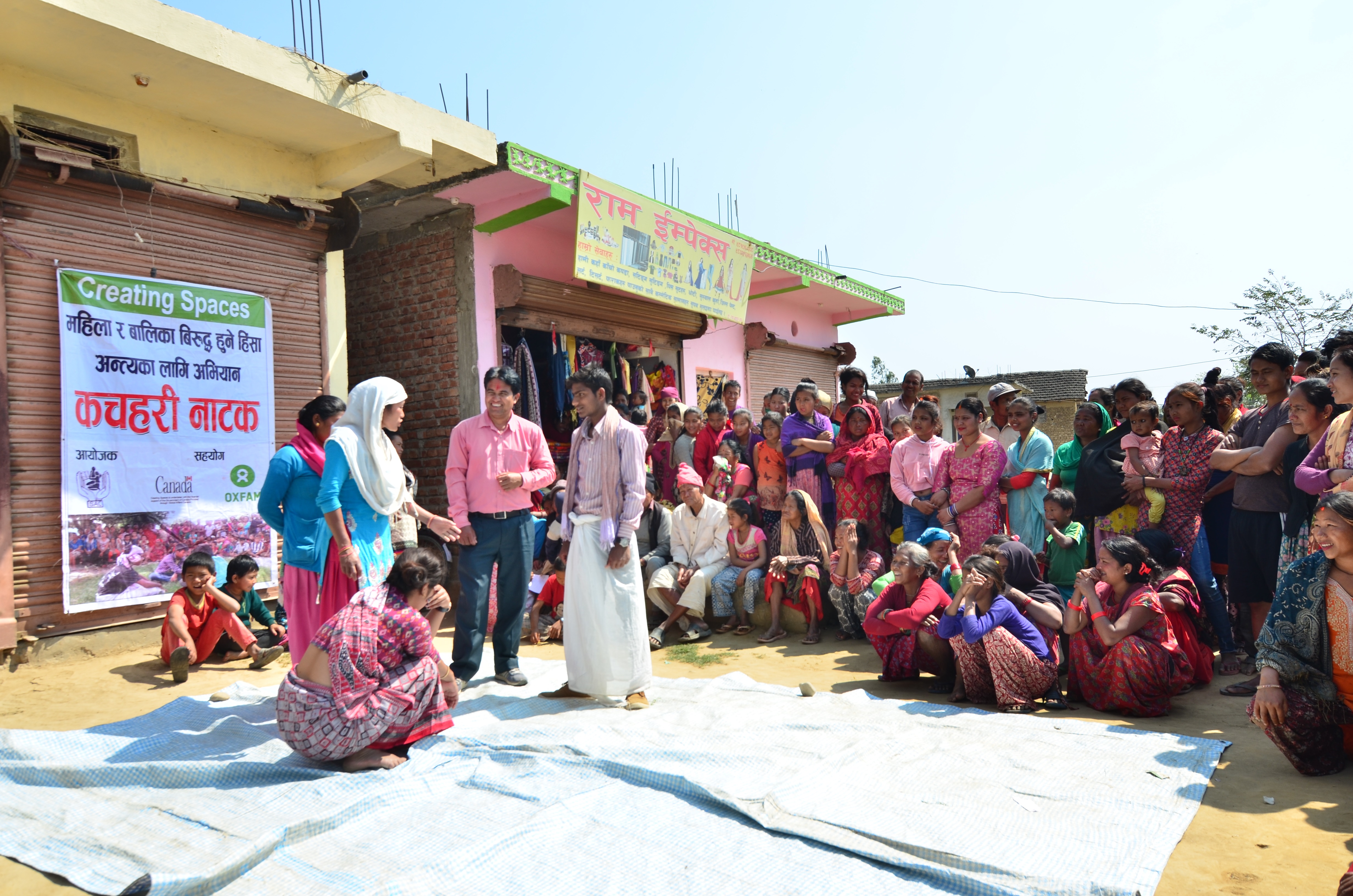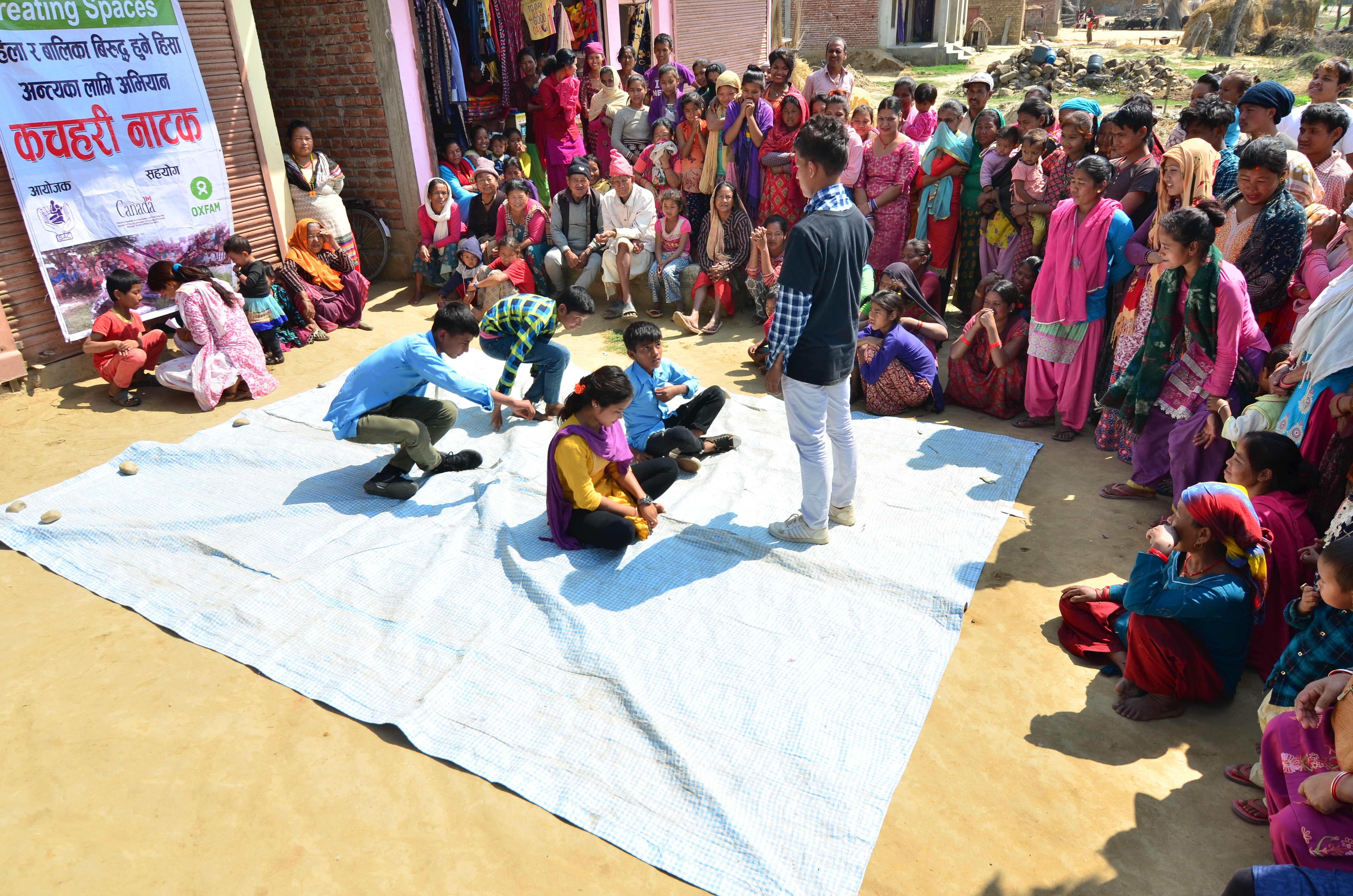Using Forum Theatre to engage communities in ending violence against women and girls
Using Forum Theatre to engage communities in ending violence against women and girls
Forum Theatre is an innovative tool to help change the social norms and cultural practices that fuel inequality. It is a dynamic and successful component of Oxfam’s Creating Spaces project to end violence against women and girls in Nepal.
In many communities, men hold power over women and women are not aware of their rights. Through the Creating Spaces project, Oxfam in Nepal is working with local partners to help women and their families prevent and overcome violence in their lives, including child and early forced marriage.

Forum Theatre, Banke District Nepal
What’s the purpose of Forum Theatre and how does it work?
Forum Theatre is an interactive experience used to share information and engage the community in a two-way communication approach to social transformation. It does this by performing a play on a certain theme of the Creating Spaces project, such as gender equality, healthy relationships, societal roles, and gender-based violence, including domestic violence and child, early and forced marriage.
The artists of the Forum Theatre perform the play and pause it in a situation when a problem arises. To help the play continue, the audience is asked, ‘What can be done to overcome the difficulty or challenge?’ After offering ways to solve the problem, audience members are invited to go act in the play using their suggestions. The goal is to change the mind of the play’s antagonist. The Forum Theatre ends when a way of overcoming the problem given by the audience is accepted by the antagonist.
Forum Theatre has proven to be a powerful way to create awareness on specific themes and topics within communities – and through participating in the play or as part of the audience – helps create change. This approach is unique in its interactive nature and not just one-way communication with the audience. Oxfam Nepal has been using Forum Theatre as a tool for social change and social mobilization for more than five years and has achieve positive impacts on many programs.
Who participates in the theatre and how do people find out about it?
People from the community make up the audience, who also participate in the play.
Oxfam and a local partner organization select and develop the artists over a rigorous two-week residential training program. Over those two weeks, the Forum Theatre group work on their skills and develop a play based on a theme related to gender-based violence and child, early and forced marriage.
Once they complete the two-week training, the artists, under the guidance of partner organizations, go back to their respective communities and perform the Forum Theatre. Promotions take place in the communities to inform when the Forum Theatre performances will be happening and to invite the community to watch and participate in the performance.

Forum Theatre: interactive street theatre on ending violence against women and girls and forced marriage, produced and delivered by local youth group supported through Oxfam's Creating Spaces project. Banke District, Nepal
What are the most compelling outcomes of the Forum Theatre program?
Through its interactive experience format, Forum Theatre is helping men, women, families and entire communities think differently about violence. It has encouraged people to express their feelings, experiences and opinions in a way that has brought tangible changes to their lives.
In addition to helping participants, the Forum Theatre artists have said that by being an artist, they have had positive transformations in their own lives. They’ve been able to build confidence in themselves by getting recognition from the community, as well as improve their social mobilization skills. Artists become leaders in their community and an example to the younger generation for social change.
More than 58 cases of child marriages have been stopped in Banke, Rautahat, Baitadi, and Dailekh districts of Nepal, and violence against women and girls is reduced. We work with everyone in communities - women, men, authorities, teachers, religious leaders - to build a safe and just world where women and girls are in control of their lives and live free from violence.
Are there other projects that use theatre?
Oxfam has a long history of using theatre and interactive performances to engage communities. In Kutupalong refugee camp in Bangladesh, a play was devised to teach children and parents good hygiene practice, including the importance of washing hands with soap, in order to prevent the spread of life-threatening diseases. Rohingya children have fun helping to make the giant puppets of germs, flies and poo which are used by the actors to demonstrate how flies transfer bacteria.

